From labourer to 'Jeera King': How Dhannalal Jain and JK Masale maintained its 67-year legacy
From working as a labourer in one of the largest wholesale markets in eastern India, to middleman in the spice trade, to spice trading and finally earning the Jeera King moniker—this is the story of Dhannalal Jain and JK Masale
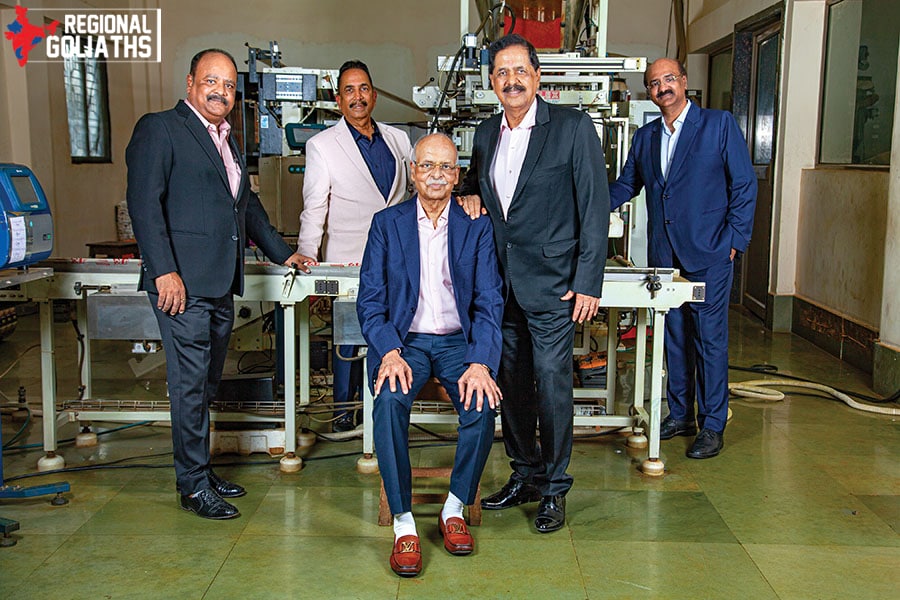 From left: The second generation of JK Masale Group—Ashok Jain, Chandra Kumar Jain, Bhagchand Jain (seated), Jai Kumar Jain and Jitendra Jain
Image: Subrata Biswas for Forbes India
From left: The second generation of JK Masale Group—Ashok Jain, Chandra Kumar Jain, Bhagchand Jain (seated), Jai Kumar Jain and Jitendra Jain
Image: Subrata Biswas for Forbes India
It all started in 1948 when Dhannalal Jain in his early 20s decided to move from the drylands of Badhal village in Rajasthan to go work in one of the largest wholesale markets in eastern India. In the initial days, he worked as a labourer in the narrow and crowded lanes of Kolkata’s Burrabazar, loading and unloading goods in carts and trucks. But in no time, he took up the role of a middleman in the spice trade, which earned him commission and sharpened his business acumen.
Five years later, in 1953, Jain took another leap by renting a small space on Armenian Street to start spice trading. He bought jeera (cumin seeds) from Asia’s largest spice market in Gujarat’s Unjha and sold it to the same merchants with whom he used to work as a broker. His strong purchasing power and network led him to become a go-to proprietor for jeera in eastern India. Along the way, he earned the tag ‘Jeera King’ (JK) and realising the potential and opportunities in the spice market, launched JK Masale in 1957.
About a decade after launching the business, they started adding more whole spices other than jeera, including ajwain, sarso, methi, saunf and turmeric. His seven sons joined the business and in 1994, the second generation introduced whole spices in packets. They faced a bit of challenge in convincing their father to switch from 40 kg gunny bags to 1 kg packets.
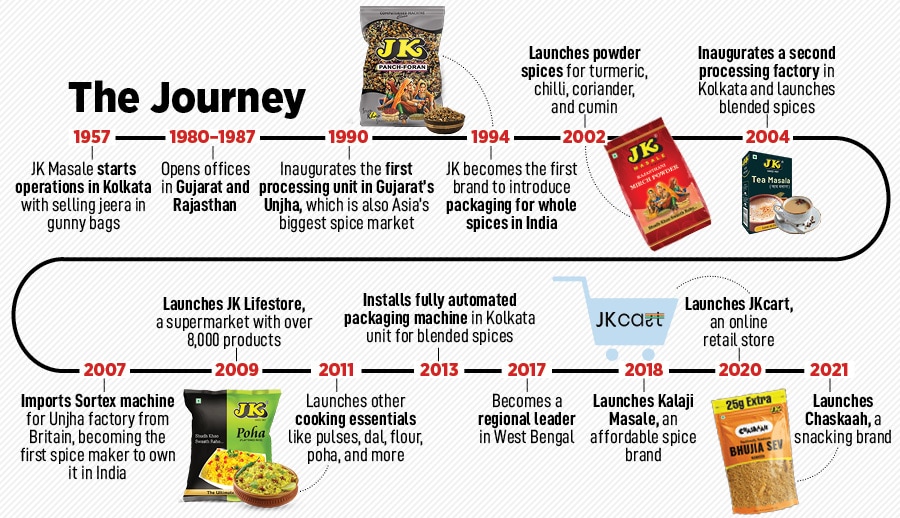
“We’ve seen our father go that extra mile to keep the business up and running. In many instances, there was a lack of funds, but he didn’t give up,” recalls Bhagchand Jain, 78, chairman of JK Masale and eldest son of the late Dhannalal. The company also moved beyond trading and shifted to processing. It operates four units in Kolkata, Jaipur, Unjha and Bhagchand, and his brothers—spread across these cities—look after the factories.
(This story appears in the 09 August, 2024 issue of Forbes India. To visit our Archives, click here.)





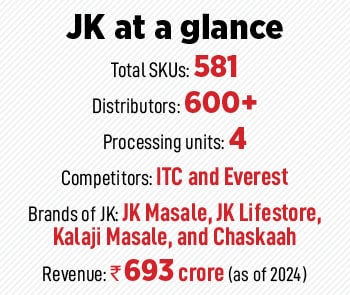 Initially the focus was on establishing the brand and reaching the maximum number of households in West Bengal, which the company seems to have succeeded at. A regular consumer says: “What Maruti used to be for cars earlier, JK is for spices in the city.”
Initially the focus was on establishing the brand and reaching the maximum number of households in West Bengal, which the company seems to have succeeded at. A regular consumer says: “What Maruti used to be for cars earlier, JK is for spices in the city.” 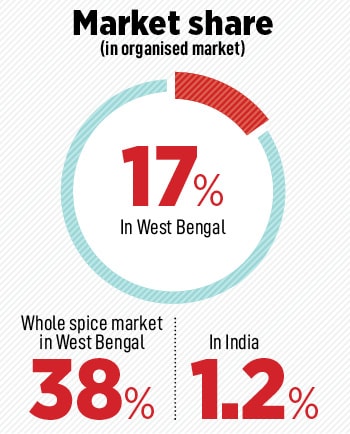 Each generation has encountered different challenges, but they have also brought in fresh ideas and innovation. While the second generation introduced 1 kg packets of spices, the third introduced smaller packs and also did marketing, roping in regional brand ambassadors. The fourth generation, who joined a couple of years ago, has introduced a snacking line with snacks like Chaskaah Aloo Bhujia, Chaskaah Tok Jhaal Mishti and Chaskaah Hing Jeera Chana. JK Masale has 581 SKUs and their best-selling products are jeera, turmeric, poppy seeds, sabudana, poha and hing.
Each generation has encountered different challenges, but they have also brought in fresh ideas and innovation. While the second generation introduced 1 kg packets of spices, the third introduced smaller packs and also did marketing, roping in regional brand ambassadors. The fourth generation, who joined a couple of years ago, has introduced a snacking line with snacks like Chaskaah Aloo Bhujia, Chaskaah Tok Jhaal Mishti and Chaskaah Hing Jeera Chana. JK Masale has 581 SKUs and their best-selling products are jeera, turmeric, poppy seeds, sabudana, poha and hing.
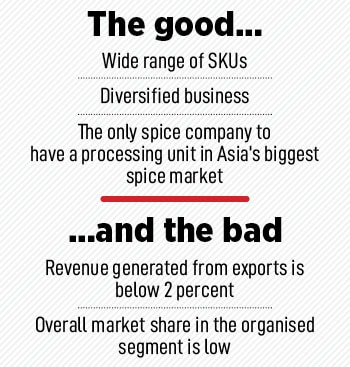 “JK Masale has cemented its position as the go-to brand for any Bengali spice, from poppy seeds to panch phoren. Now quick commerce has taken them from Bengal to Bharat,” adds Abhik Choudhury, founder of brand consultancy firm Salt and Paper. “Because of the big grocery app wave, suddenly good regional spices with strategic pricing could compete with the big companies on an equal footing. Now JK is in the kitchen cabinets of not only Kolkata but also Delhi, Mumbai and Bengaluru. It’s no longer just an eastern Indian spice brand,” he says.
“JK Masale has cemented its position as the go-to brand for any Bengali spice, from poppy seeds to panch phoren. Now quick commerce has taken them from Bengal to Bharat,” adds Abhik Choudhury, founder of brand consultancy firm Salt and Paper. “Because of the big grocery app wave, suddenly good regional spices with strategic pricing could compete with the big companies on an equal footing. Now JK is in the kitchen cabinets of not only Kolkata but also Delhi, Mumbai and Bengaluru. It’s no longer just an eastern Indian spice brand,” he says.














